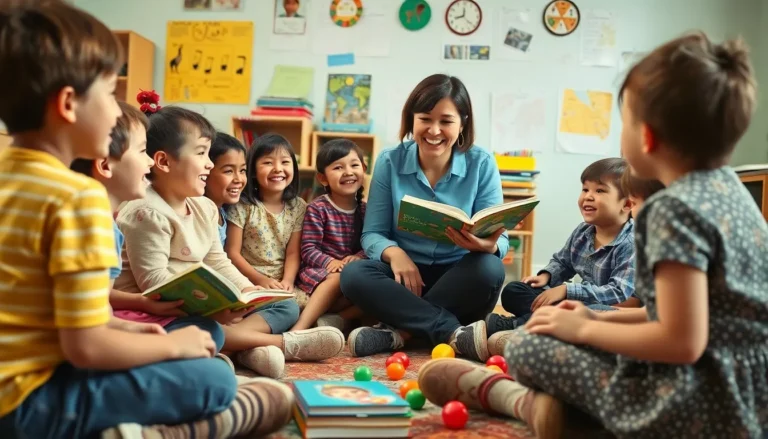Table of Contents
ToggleGrowing up in a household ruled by an authoritarian parenting style can feel like living in a boot camp—complete with strict rules and little room for negotiation. While some might think this approach builds character, the reality is a bit more complicated. Children raised under such regimes often find themselves navigating a world filled with anxiety and rebellion, all while trying to figure out how to express their individuality without getting grounded for life.
But what does this mean for their future? These kids might just turn out to be the most resilient, albeit slightly quirky, adults in the room. They could be the ones who challenge authority in creative ways or perhaps become experts at sneaking snacks after bedtime. Dive into the nuances of authoritarian parenting and discover how it shapes children’s lives in ways that are both surprising and enlightening.
Overview of Authoritarian Parenting
Authoritarian parenting features high demands and low responsiveness. This style emphasizes obedience, discipline, and adherence to rules. Children raised in this environment often experience strict regulation and limited freedom. Authority figures enforce rules rigidly, leaving little room for negotiation or personal expression.
Typically, parents employing this method prioritize order and structure above all else. They expect compliance from their children without question. These expectations can lead to stress and anxiety as children navigate their emotional landscape. Moreover, the lack of warmth may hinder the development of independence and self-confidence.
Research shows that children in authoritarian households may struggle with self-esteem. They often comply outwardly but may harbor resentment inwardly. As they grow, many challenge authority in unconventional ways, possibly rebelling against previously accepted norms. A study by Baumrind indicates that these children can experience heightened levels of behavioral issues compared to their peers.
Under authoritarian parenting, children may learn to prioritize obedience over self-advocacy. Emotional expression often remains suppressed, impacting interpersonal relationships later in life. Supporting evidence reveals that this lack of emotional intelligence contributes to difficulties in social settings.
Consequently, the long-term effects manifest in complex character traits. Resilience may develop alongside confrontation of authority figures. Individuals may advocate for their independence through various means, often leading to a unique blend of conformity and rebellion. Understanding this parenting style’s implications equips caregivers to foster healthier family dynamics.
Impact on Emotional Development
Authoritarian parenting significantly impacts children’s emotional growth. They often face challenges in developing a healthy sense of self.
Effects on Self-Esteem
Self-esteem commonly suffers in children raised under authoritarian regimes. Lack of supportive feedback leads to feelings of inadequacy. These children often doubt their abilities, as unconditional love is scarce. Instead of flourishing, they may become overly dependent on external validation. Struggling with comparison to their peers, they might internalize negative messages. Research indicates that diminished self-worth appears as a common outcome. Obeying rigid rules, they often suppress their true selves, creating an internal conflict.
Relationship with Anxiety
Anxiety frequently manifests among children of authoritarian parents. Constant pressure to comply breeds a fear of failure, causing excessive worry. This fear often leads to avoidance behaviors in social situations. Difficulty in expressing emotions compounds this issue, as children feel unable to voice their concerns. Consequently, the inability to manage feelings often results in heightened stress. Studies show that these children may develop anxiety disorders during adolescence. Understanding this dynamic is crucial for addressing emotional challenges later in life.
Cognitive Outcomes
Authoritarian parenting significantly influences children’s cognitive development. Limited emotional support can lead to various academic and cognitive challenges.
Academic Performance
Students raised in authoritarian households often struggle with academic performance. Strict rules can create anxiety around failure, making it difficult for them to focus on learning. Research shows that these children may exhibit lower grades compared to peers with more supportive parenting styles. High pressure to meet demands may hinder motivation. In some cases, children prioritize obedience over genuine interest in subjects, leading to disengagement. The lack of open communication can prevent them from seeking help when needed, resulting in persistent academic difficulties.
Critical Thinking Skills
Critical thinking skills frequently suffer in children of authoritarian parents. Rigid environments leave little room for creativity and independent thought. Children learn to follow directives rather than question or analyze situations. Studies indicate that this parenting style fosters passive learning, reducing their ability to engage in problem-solving independently. With little encouragement to express their opinions, these children may struggle to articulate thoughts or evaluate differing viewpoints. Social interactions often become challenging as a result, limiting opportunities to develop necessary critical reasoning skills.
Social Skills and Relationships
Children whose parents exhibit an authoritarian parenting style face notable challenges in social skills and building relationships. The strict environment limits opportunities for healthy peer interactions and emotional growth.
Peer Interactions
Peers often become difficult to navigate for those raised under authoritarian parenting. Expressing emotions can feel intimidating, leading to heightened anxiety during social situations. Reflecting on this, children may struggle to initiate friendships or maintain them, fearing potential rejection or criticism. They often prioritize compliance over authenticity, avoiding situations that demand emotional expression. Acceptance within a group becomes essential, so they may conform to fit in, sacrificing individuality. Consequently, their inability to assert themselves can result in difficulties addressing conflicts or establishing boundaries. Emotional detachment during peer interactions can hinder the development of empathy, further complicating their social integration.
Family Dynamics
Family dynamics play a crucial role in shaping children’s relationships. Authoritarian parenting fosters an environment where emotional expression is undervalued. As a result, children may find it challenging to communicate effectively with family members. Trust issues often arise due to a lack of open dialogue, preventing healthy discussion of feelings. Parents’ rigid expectations can discourage children from seeking support within the family unit. Consequently, devoid of emotional connection, relationships with siblings and parents may suffer. These dynamics contribute to a cycle of silenced emotions, causing children to carry over these patterns into their outside relationships. Thus, their long-term social skills and ability to forge meaningful bonds can be significantly impaired.
Long-Term Effects
Children whose parents adopt an authoritarian parenting style display various long-term effects that impact their emotional, cognitive, and social development. Anxiety frequently emerges due to constant pressure to conform and fear of failure. Resentment often develops, as children struggle internally against rigid rules while outwardly complying.
Low self-esteem commonly plagues these children, arising from a lack of supportive feedback throughout their upbringing. Dependence on external validation becomes a primary source of self-worth, severely hindering personal development. Cognitive challenges manifest in academic settings, with children frequently experiencing increased anxiety that discourages engagement in learning.
Poor academic performance arises as a direct correlation with limited emotional support. Motivation tends to dwindle, causing significant drops in grades compared to peers reared in nurturing environments. Creativity suffers as children adapt to rigid structures, leading to passive learning experiences that impede independent thinking.
Navigating social situations proves challenging as well. Difficulty initiating and maintaining friendships results from fears of rejection and criticism, further isolating these children. Empathy may remain underdeveloped due to emotional detachment from peers and family dynamics. Trust issues also arise within families, where undervalued emotional expression creates barriers to healthy communication.
Eventually, these children confront complications in forming authentic relationships, often reinforcing cycles of silenced emotions. Social skills take a tangible hit, impacting all areas of life. Understanding these long-term effects equips caregivers to better address and support the emotional needs of children raised in authoritarian environments.
Children whose parents have an authoritarian parenting style often face significant challenges in their emotional and social development. The strict environment leaves little room for self-expression and autonomy, resulting in anxiety and low self-esteem. They may struggle to form genuine connections with peers due to fears of rejection and criticism.
As they grow, these children might rebel against authority or develop trust issues within their families, complicating their ability to communicate openly. Recognizing the long-term impacts of this parenting style is essential for caregivers seeking to foster healthier emotional landscapes for their children. By understanding these dynamics, parents can create more supportive environments that encourage independence and self-confidence.







